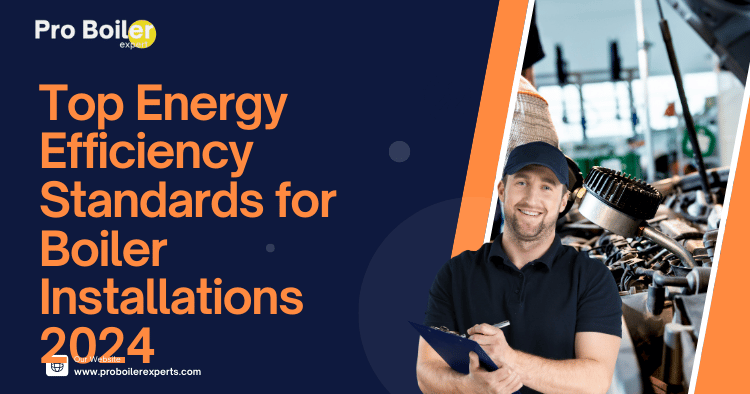Table of Contents
- Introduction to Energy Efficiency Standards
- Importance of Energy Efficiency in Boiler Installations
- Overview of Energy Efficiency Standards
- Key Energy Efficiency Standards for 2024
- How to Choose an Energy-Efficient Boiler
- FAQs
- Conclusion
Introduction to Energy Efficiency Standards
Energy efficiency standards serve as crucial benchmarks for the manufacturing and installation of heating systems, including boilers. These standards not only promote the adoption of energy-efficient technologies but also contribute to the reduction of greenhouse gas emissions, lower energy costs, and enhance the overall effectiveness of heating systems. As we enter 2024, it is imperative to grasp the latest energy efficiency standards for boiler installations.
Importance of Energy Efficiency in Boiler Installations
Boilers are key components of heating systems in both residential and commercial buildings. Inefficient boilers can result in excessive energy consumption, leading to higher utility bills and a larger carbon footprint. By adhering to energy efficiency standards, homeowners and businesses can:
- Reduce Energy Costs: Energy-efficient boilers consume less fuel, resulting in significant savings over time.
- Decrease Environmental Impact: Lower energy consumption reduces greenhouse gas emissions.
- Enhance System Longevity: Energy-efficient systems often last longer due to reduced wear and tear.
Investing in energy-efficient boilers is not merely a financial decision; it also plays a vital role in contributing to a sustainable future.
Overview of Energy Efficiency Standards
Energy efficiency standards are established by various organizations and regulatory bodies to ensure that boilers and other heating systems meet specific performance criteria. These standards are routinely updated to reflect technological advancements and environmental objectives, enabling consumers to make informed choices when selecting a boiler.
Key Energy Efficiency Standards for 2024
4.1 ASME Boiler and Pressure Vessel Code
The ASME Boiler and Pressure Vessel Code outlines safety and performance standards for boilers and pressure vessels. Compliance with this code ensures that installations are safe and efficient, covering aspects such as design, materials, fabrication, installation, and inspection.
Key Benefits:
- Ensures safety and reliability in boiler operations.
- Provides guidelines for maintenance and inspection.
For insights into boiler safety and performance, consider reading the Essential Legal Requirements for Boiler Installation.
4.2 Energy Star Certification
Energy Star is a well-known symbol for energy efficiency, endorsed by the U.S. Environmental Protection Agency (EPA). Boilers that receive the Energy Star label must meet stringent energy efficiency criteria, often exceeding minimum standards set by federal regulations.
Key Features:
- Energy Star-certified boilers can be up to 20% more energy-efficient than conventional models.
- Products are tested and verified by independent laboratories, ensuring reliability.
For more information, visit the Energy Star website.
4.3 ErP Directive
The Energy-related Products (ErP) Directive is a European Union regulation aimed at enhancing the environmental performance of energy-consuming products. For boilers, the directive establishes minimum efficiency requirements and encourages the development of innovative technologies.
Key Aspects:
- Sets minimum efficiency requirements for heating products.
- Promotes the use of renewable energy sources, such as biomass and solar thermal.
Learn more about the ErP Directive on the European Commission’s website.
4.4 ANSI/ASHRAE Standards
The American National Standards Institute (ANSI) and the American Society of Heating, Refrigerating and Air-Conditioning Engineers (ASHRAE) provide a series of standards addressing efficiency, performance, and design of heating systems, including boilers.
Key Standards:
- ANSI/ASHRAE 90.1: Establishes minimum energy efficiency requirements for buildings.
- ANSI/ASHRAE 62.1: Focuses on ventilation requirements for acceptable indoor air quality.
For detailed information on these standards, visit the ASHRAE website.
How to Choose an Energy-Efficient Boiler
When selecting an energy-efficient boiler, consider the following factors:
| Factor | Description |
|---|---|
| Fuel Type | Decide whether you want a gas, oil, or electric boiler. Each has its own efficiency ratings and costs. |
| Efficiency Rating | Look for boilers with high efficiency ratings (e.g., AFUE rating of 90% or higher). |
| Size and Capacity | Ensure the boiler is appropriately sized for your needs. An oversized boiler will cycle on and off frequently, reducing efficiency. |
| Rebates and Incentives | Check for available rebates for energy-efficient appliances, which can significantly reduce upfront costs. |
Choosing the right boiler requires careful consideration of these factors, ensuring you get the best performance while minimizing energy costs. For more on how to assess your heating needs, refer to our guide on Top 5 Tips for Assessing Your Home Heating Needs.
FAQs
Q: What is the most energy-efficient type of boiler?
A: Condensing boilers are generally considered the most energy-efficient type because they utilize the heat from flue gases, achieving efficiencies of over 90%.
Q: How do I know if my boiler meets current energy efficiency standards?
A: Check the manufacturer’s specifications and look for certifications such as Energy Star or compliance with the ASME Boiler and Pressure Vessel Code.
Q: Are energy-efficient boilers more expensive?
A: While the initial cost may be higher, energy-efficient boilers typically save money in the long run through lower energy bills.
Conclusion
As we move into 2024, understanding and complying with energy efficiency standards for boiler installations is essential for homeowners and businesses alike. These standards guide us toward more environmentally friendly choices while offering significant financial benefits. By investing in energy-efficient boilers, you not only contribute to a sustainable future but also enjoy reduced energy costs. For more information, consider checking resources like the U.S. Department of Energy or your local energy authority.
By staying informed about the latest standards and technologies, you can make the best choice for your heating needs. Happy heating!





